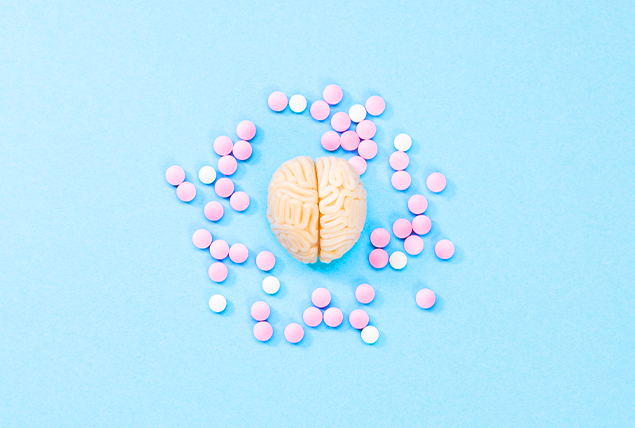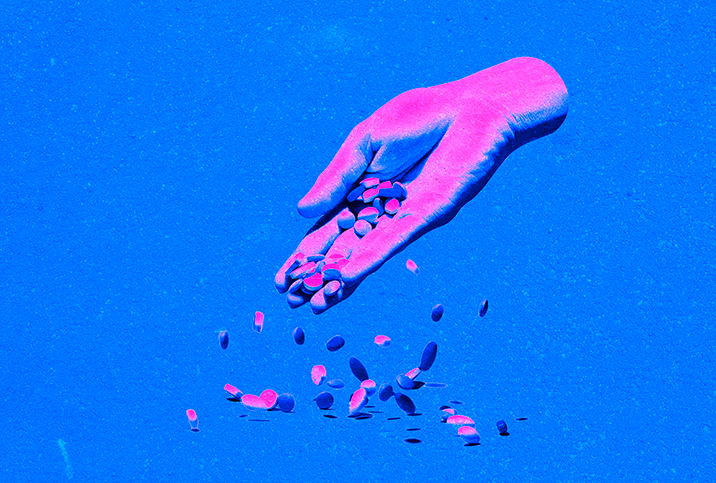Feeling a Lack of Libido? It Could Be Post-SSRI Sexual Dysfunction

Some people experience side effects while taking SSRIs, or selective serotonin reuptake inhibitor antidepressants, that quickly disappear once the medication is stopped.
But people with post-SSRI sexual dysfunction (PSSD) continue experiencing a decline in their sexual function and libido, feeling "foggy" or emotionally numb for an extended time long after discontinuing the medication.
A firsthand story of PSSD
After Rosie Tilli, 23, a nurse in Melbourne, Australia, took her first dose of escitalopram, she immediately knew something was wrong. Tilli began to experience brain fog, an inability to feel or express her emotions and a lack of sexual libido.
When she reported these symptoms to her doctor, her concerns were dismissed. She was told it was normal to experience side effects during the first eight weeks of taking a new medication, and she was encouraged to keep taking it.
"As the eight weeks passed, the side effects got worse and worse," Tilli said. "I only took it for four and a half months, and I took my last pill on December 7, 2020. My life has been on a downward spiral ever since."
Despite only taking Lexapro for several months more than three years ago, Tilli still suffers from impacts of post-SSRI sexual dysfunction that affect her life today.
What is PSSD?
Cases of PSSD have been reported for decades, with the first mentions of PSSD in medical literature dating back to a 2006 article.
But reports of sexual dysfunction associated with SSRIs have been reported since 1991, according to a 2019 study. The Pharmacovigilance Risk Assessment Committee (PRAC) formally acknowledged the need to alert consumers to the possibility of continued sexual dysfunction symptoms after stopping treatment in a 2019 document that recommends precautionary label warnings.
Also, the U.S. Food and Drug Administration (FDA), in 2021, began requiring SSRI manufacturers to include warnings about sexual dysfunction side effects throughout the packaging: in the adverse reaction section (where it was already required), in the warnings and precautions, in the patient counseling section and in the medication guide.
That doesn't acknowledge PSSD, necessarily, but it brings the sexual dysfunction side effects to the forefront.
The persistent symptoms that outlast SSRI use are both sexual and nonsexual in nature, making the name PSSD a bit of a misnomer, said Yassie Pirani, M.S.W., R.S.W., a counselor specializing in PSSD in Vancouver, Canada.
'There is no way to describe the toll this injury can take on someone's life and the depth of loss that people experience.'
In her work, Pirani sees patients experiencing the following PSSD symptoms:
- Genital numbness
- Anorgasmia (difficulty or inability to orgasm)
- Reduced or eliminated sexual sensation
- Reduced or eliminated libido
- Erectile dysfunction
- Loss of sensitivity in the nipples
- Reduced vaginal lubrication
In addition to these sexual side effects, she said many people suffering from PSSD also experience the following symptoms:
- Anhedonia, or a reduced ability to experience pleasure
- Emotional numbing
- Cognitive impairment
- Depersonalization
- Brain fog
- Memory issues
- Sensory problems involving skin, smell, taste or vision
In some cases, individuals experience a total loss of their ability to connect with others.
"There is no way to describe the toll this injury can take on someone's life and the depth of loss that people experience," Pirani said. "To have your ability to experience an intimate relationship, to feel at home in your own body and to have functioning emotions completely removed by a medication that was meant to alleviate your emotional distress is a catastrophic thing to happen to someone."
Till said PSSD has robbed her of the ability to feel emotionally connected to others—any romantic or sexual attraction. Basically any kind of pleasure is absent, including from books or music.
"Ironically, PSSD has made my mental health a hundred times worse than anything I was originally seeking treatment for," she said. "If I had known that I could be rendered this severely dysfunctional for the rest of my life, I would never have touched that medication."
How common is PSSD?
Despite these extremely severe side effects, systematic research on the condition is severely lacking, so the actual prevalence of post-SSRI sexual dysfunction is unknown. But some preliminary evidence suggests PSSD might not be that uncommon.
Roughly 360 out of 1,654 reports of sexual dysfunction associated with SSRI use continued after the patient stopped taking the drug, according to data released in 2021 by the Medicines and Healthcare Products Regulatory Agency in the U.K.
Pirani is co-authoring a manuscript for an article awaiting publishing. Her manuscript contains data suggesting an estimated 25 percent of people who take SSRI medications may experience the persistence of at least one of the above-mentioned sexual symptoms despite treatment discontinuation.
And yet, many patients who are prescribed these kinds of medications remain unaware of the risks. Like Till, Emily Grey, 27, an in-facility Alzheimer's caregiver in Nanaimo, British Columbia, was given no warning of the potential risks when her doctor handed her an SSRI prescription.
A lack of research and awareness results in many people having their PSSD symptoms minimized and dismissed as a valid healthcare concern.
"My doctor didn't even go over the very common temporary sexual side effects that most people experience on antidepressants," Grey said. "The truth is, most doctors have not been informed that PSSD can even happen. If they don't know, how can they inform their patients?"
She first noticed symptoms of PSSD about two weeks into the tapering process when she was coming off of citalopram. She describes the experience as extremely sudden and alarming.
"I woke up one morning and immediately knew something was wrong—like a switch had been flipped in my body and some essential inner energy shut down," she said. "I felt lethargic, and there was a cold, clammy feeling in my genitals. I quickly realized that all sexual sensations had disappeared from my body, everything from arousal to orgasm and even romantic emotion. It has now been four years with no improvement."
Grey also suffers from blunted emotions, particularly when it comes to romantic love, as well as fatigue and memory issues. She describes the effects as "a horrifying mutilation of [her] essential self."
Is there any treatment for PSSD?
There is no treatment or cure for post-SSRI sexual dysfunction, though some medications may help minimize the side effects. Treatments for PSSD, such as low-power laser irradiation and phototherapy, may be effective in some cases, according to a 2018 report.
As a result of the lack of research and awareness surrounding PSSD, many people have their PSSD symptoms minimized and dismissed as a valid healthcare concern. That only compounds their suffering, according to Pirani.
When patients' experiences are invalidated, they may blame themselves. People may go into a spiral of shame, self-loathing, depression and anxiety, or suicidality.
"This condition is incorrectly perceived to be somatic or psychological rather than iatrogenic (from the medication)," Pirani said. "When people seek help and report their experiences of genital numbness, for example—a core feature of PSSD—they are diagnosed with delusional or somatoform disorders and prescribed antipsychotic medications, rather than diagnosed with PSSD."
Till said she encountered this attitude when she went to her doctor for help. She said she was given another medication, but it only worsened her symptoms. Since Till's symptoms first began, she's been to a total of 25 doctors, none of whom have been able to provide her with relief.
Ruben D., 25, is a lead software engineer at a data science and IoT company in Frankfurt, Germany, who watched his partner of four years develop PSSD after coming off of venlafaxine about 10 months ago. Though he describes her case as relatively mild compared to others, her symptoms still had a huge impact on their relationship. The medication essentially eliminated her ability to feel romantic or sexual feelings.
After spending a few months looking into the condition and speaking with patients and their loved ones, Ruben realized the PSSD community didn't have a proper global organization to advocate on its behalf. Ruben decided to change that.
What are some resources for people with PSSD?
Ruben created the PSSD Network, a global organization that aims to raise awareness about the condition and accelerate research efforts to find treatments and a cure—neither of which currently exists.
They recently launched a PSSD public awareness photo campaign in which sufferers were asked to take a photo of themselves holding a piece of paper describing how PSSD has impacted their lives. They use TikTok to spread the word.
Some of their PSSD TikTok videos have garnered hundreds of thousands of views. Many people commented that they relate to the condition even though they had never heard of the term.
The organization found a scientific advisor to help them set up new PSSD research.
"It is important to emphasize that we, as patients and loved ones, have the power to decide the future of PSSD," Ruben said. "Once we as a community are able to encourage new research groups to form and support existing research, it is only a matter of time before treatment methods for PSSD are developed."
The bottom line
Post-SSRI sexual dysfunction affects the long-term quality of life for many people. But more research is needed to learn why this occurs.
"No one should be taking these medications without full informed consent," Grey said. "Some people's mental health problems will be so bad that the risk is worth it to them, and they should have access to antidepressants in those cases. But they must go in with their eyes open and understand the risks."


















